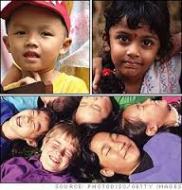I have long thought of myself as an open fair minded individual. I have some biases but in generally accepting if not at least tolerant of most cultures, races and ways of life. It is after all a small world and we need to share it. Arnett’s article “The Neglected 95%”, gave me a different perspective. Much of the research reported in our journals make broad conclusions regarding child development despite the fact that it is completed on a small percentage of the world population. Arnett states, “by concentrating primarily on Americans, psychological researchers in the United States restrict their focus to less than 5% of the world’s total population. The rest of the world’s population, the other 95%, is neglected” (2008. p. 602).
http://www.factmonster.com/ipka/A0930058.html
At first one may think this is racism. I do not think so. I think it is more a matter of egocentrism or sorts. It is the basis of this class; a matter of global perspective. As researchers try to explain the norm for any given topic including early childhood, they look around themselves for a baseline – a norm. When starting the course I assumed we would be looking at early childhood globally. I felt confident that I was familiar with a wide variety of cultures and cognizant of my limited knowledge of many more. I did not however, consider the why and the implications of this lack of global perspective had on the field of early childhood nor how rampant it was.
In the field much of how we provide care for young children is based on research. Research is complied, compared with other reports and existing theories and analyzed to help form standards and even new theories. One flaw of this research is where the research is conducted. A large percentage of child development theories were developed in European countries based on European children. Why are we using a small percentage of the population to develop theories for the world? Is it reasonable to expect all children to develop universally despite a wide range of experiences and cultural differences?
A second consideration is who is in charge and conducting the research. Most research is led by if not conducted by individuals established in the field of early childhood. This requires time. The result is an older generation conducting research. This generation has formed opinions possibly to the point of bias. In addition, they are from a generation that is not as global as today’s society. Today, children in our country encounter peers literally from around the world. When I was a child we went to school our entire elementary and high school years with the same peers. People grew up in the same communities their parents and grandparents did. Wouldn’t this generational community have an impact on a child’s development as does the child that has lived in more than one culture?
Finally, we must consider the fact of change. John Maxwell said, “Change is inevitable. Growth is optional.” If change is inevitable would this not apply to a child’s development as well? Is it reasonable to use standards and theories developed nearly a century ago to children of today? The concept of early childhood children are being “taught” is a change.
https://www.facebook.com/ExplorationsEarlyLearning
Many cultures do not have children attending programs ‘preparing’ them for future learning. A short time ago the majority of United States children (and still many today) as well as many children around the world spend their days in mixed aged groups simply playing. Play has been the focus of many, yet in our culture we rarely allow our children to simply play. Somewhere I read that Piaget said “Play is the work of children.” But what is play?

 https://www.facebook.com/ExplorationsEarlyLearning
https://www.facebook.com/ExplorationsEarlyLearning
In our society we push our children to succeed and learn. We strive to provide rich environments to enhance this process. Despite all of this, Ryan reports that children of “the U.S. scores below average in math and ranks 17th among the 34 OECD countries. It scores close to the OECD average in science and reading and ranks 21st in science and 17th in reading” (2013). Ryan claims “The U.S. ranks fifth in spending per student” (2013). The answer is not money.
There has been a lot of “improving” our educational programs. Maybe it is time to redesign our educational programs instead of improving a broken system. This time around we could keep the child as the focus instead of the end product. If we have learned anything about early childhood we know it is process that is important not product.
Throughout my journey through this class one individual has had a major impact on me – Dan Podraza. Dan has been a wonderful unexpected asset and inspiration. I am not even sure he is aware of the impact he has had on me. His gentle reminders and encouragement gave me the strength and willpower needed to complete the class. He is a true team player. We need more people in this world like him. My personal experiences this semester have made me look at life differently. Sometime adults (just like children) need real life experiences to learn. When we experience something the learning is more complete and meaningful. While we can learn individually the experience is more complete when done with another at your side or having your back. Learning is after all a social experience.
It does not stop with childhood. We all need these experiences.
Bibliography
Arnett, J. J. (2008). The neglected 95%: Why American psychology needs to become less American.American Psychologist, 63(7), 602–614.
Ryan, J. (2013, December 3). American Schools vs. the World: Expensive, Unequal, Bad at Math. Retrieved from The Atlantic: http://www.theatlantic.com/education/archive/2013/12/american-schools-vs-the-world-expensive-unequal-bad-at-math/281983/



